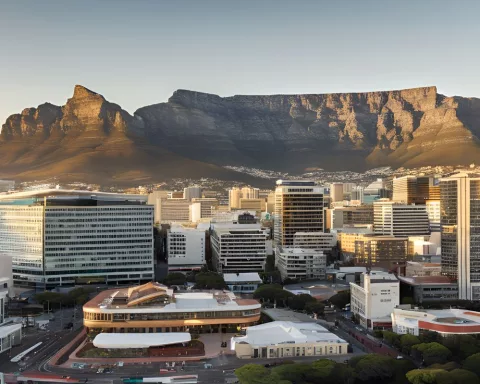Cape Town’s economy has been growing steadily, with the lowest jobless rate nationwide. The city saw an addition of 43,000 fresh job opportunities in the concluding quarter of 2023, reflecting a sturdy annual growth of 7.4% in employment. The surge in employment was distinctly visible in the trade and finance sectors, and the Jobs Connect program significantly contributed to employment growth. Cape Town is establishing a benchmark for others to emulate, redefining the concept of flourishing amidst adversity and growth despite challenges.
How has Cape Town’s economy been growing?
Cape Town’s economy has been experiencing steady growth, with a lowest jobless rate nationwide. In the concluding quarter of 2023, the city saw an addition of 43,000 fresh job opportunities, reflecting a sturdy annual growth of 7.4% in employment. Cape Town reached a new high with 1.788 million people actively employed, the highest since 2008. The surge in employment was distinctly visible in the trade and finance sectors. The Jobs Connect program has significantly contributed to employment growth.
Enthralling Economic Landscape
Among South Africa’s urban landscapes, Cape Town is a crown jewel, particularly noted for its lowest jobless rate nationwide. In the concluding quarter of 2023, the metropolis saw an addition of an astounding 43,000 fresh job opportunities, reflecting a sturdy annual growth of 7.4% in employment. This information, extracted from the latest Quarterly Labour Force Survey released by Statistics South Africa, paints a lively portrait of a city experiencing dynamic expansion and economic progression.
As the year drew to a close, Cape Town reached a new high with 1.788 million people actively employed. This record-breaking figure, the highest since the launch of the revamped Quarterly Labour Force Survey in 2008, represents a significant transformation in the city’s fiscal terrain. Since the commencement of the current local government tenure in November 2021, Cape Town has effectively generated 363,000 job opportunities.
The profound impact of gainful employment, particularly for first-time job seekers, is immeasurable. Many of the recent job entrants are Capetonians making their debut into the professional realm. Their individual experiences contribute significantly to the larger story of the city’s evolution.
A Visionary’s Perspective
Cape Town’s Mayor, Geordin Hill-Lewis, who stands at the forefront of this transformation, shared his outlook. He underscored the city’s dedication to promoting sustained growth and alleviating poverty by making substantial investments in infrastructure. An astounding R43 billion has been allocated for expenditure over the forthcoming three years. This investment, surpassing the combined contributions of Johannesburg and Durban, is projected to create 135,000 direct job positions, aside from the countless economic benefits associated with enhanced infrastructure.
Sector-Specific Advancements
In the final quarter of 2023, the surge in employment was distinctly visible in the trade and finance sectors. Alderman James Vos, the City’s Mayoral Committee Member for Economic Growth, elucidated that this increment was consistent with strategic efforts to cultivate opportunities in tourism and business process outsourcing (BPO).
Vos underscored the tourism boom in December, as Cape Town International Airport experienced a record 317,000 round-trip international passengers during the month. This surge converted into an estimated R1.9 billion in international tourist expenditure, primarily within Cape Town, and positively impacted retail and transport sectors.
Initiatives and Impacts
The Jobs Connect program, the city’s leading workforce development initiative, has significantly contributed to employment growth. This initiative, which was active from September to December, aimed to assist 10,000 Capetonians in securing job prospects. Exceeding its target, the initiative facilitated 12,914 job placements, with a majority, 9,147, assigned to call centers across the metropolitan area via CapeBPO, the City’s Special Purpose Vehicle in the industry, as reported by Alderman Vos.
Cape Town’s narrative is evidence of a city in flux, a bustling metropolis brimming with economic vitality and opportunities. Through strategic investments, targeted campaigns, and proactive initiatives, this South African city is establishing a benchmark for others to emulate, redefining the concept of flourishing amidst adversity and growth despite challenges. Indeed, Cape Town’s narrative is not just a statistical account but a testament to real people creating substantial change and crafting a colorful mosaic of economic triumph and fortitude.
What is Cape Town’s jobless rate?
Cape Town has the lowest jobless rate nationwide in South Africa.
How many job opportunities were added in the concluding quarter of 2023 in Cape Town?
Cape Town saw an addition of 43,000 fresh job opportunities in the concluding quarter of 2023.
In which sectors was the surge in employment distinctly visible in Q4 2023?
The surge in employment was distinctly visible in the trade and finance sectors in Q4 2023.
What is the Jobs Connect program and how has it contributed to employment growth in Cape Town?
The Jobs Connect program is Cape Town’s leading workforce development initiative aimed at assisting Capetonians in securing job prospects. The initiative facilitated 12,914 job placements, with a majority, 9,147, assigned to call centers across the metropolitan area via CapeBPO, the City’s Special Purpose Vehicle in the industry, as reported by Alderman James Vos. The Jobs Connect program significantly contributed to employment growth in Cape Town.
What is Cape Town’s Mayor’s outlook towards sustained growth and poverty alleviation in Cape Town?
Cape Town’s Mayor, Geordin Hill-Lewis, underscores the city’s dedication to promoting sustained growth and alleviating poverty by making substantial investments in infrastructure. An astounding R43 billion has been allocated for expenditure over the forthcoming three years.
How has tourism impacted Cape Town’s economy?
Tourism has had a positive impact on Cape Town’s economy, particularly in December when Cape Town International Airport experienced a record 317,000 round-trip international passengers during the month. This surge converted into an estimated R1.9 billion in international tourist expenditure, primarily within Cape Town, and positively impacted retail and transport sectors.












